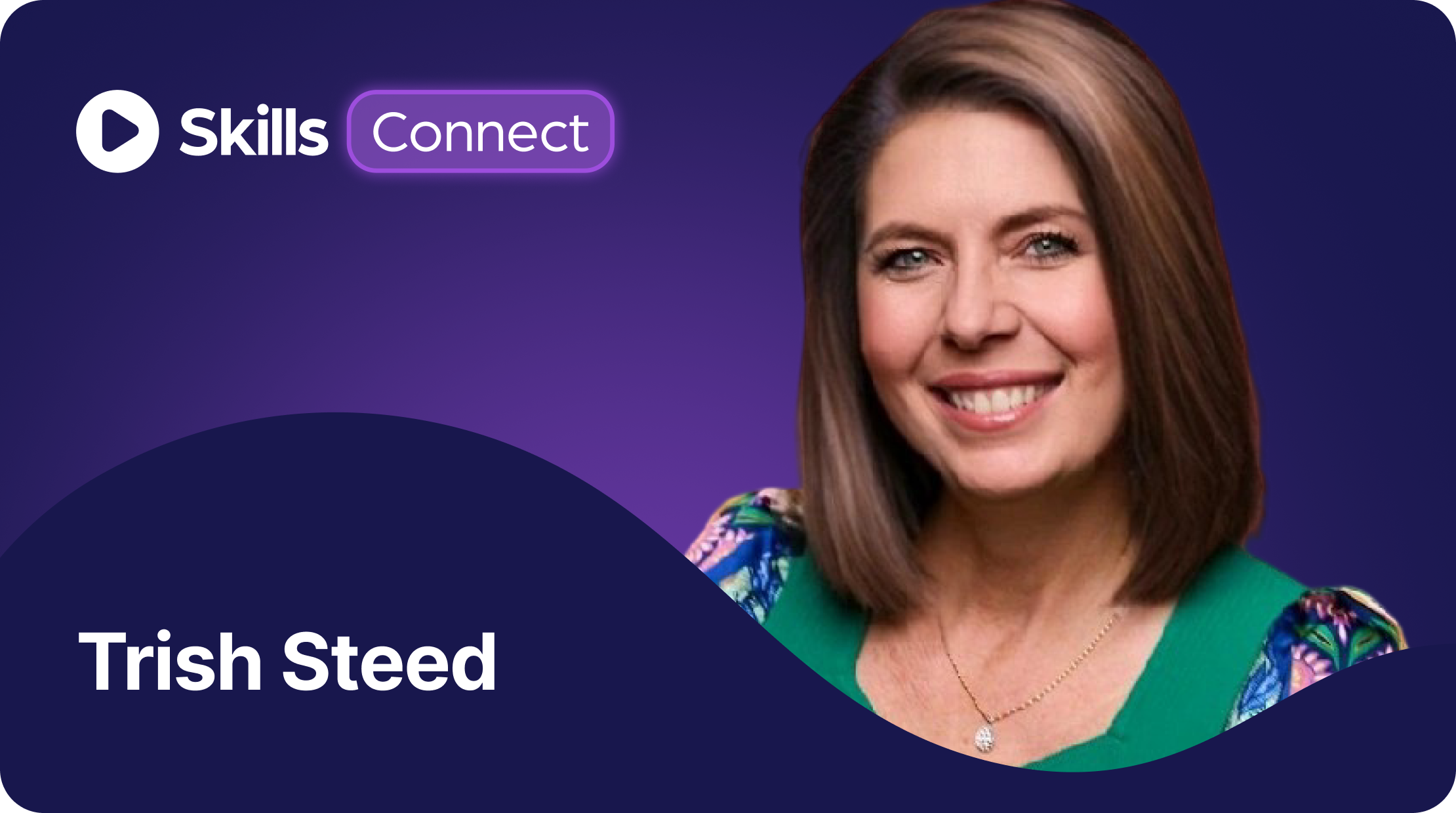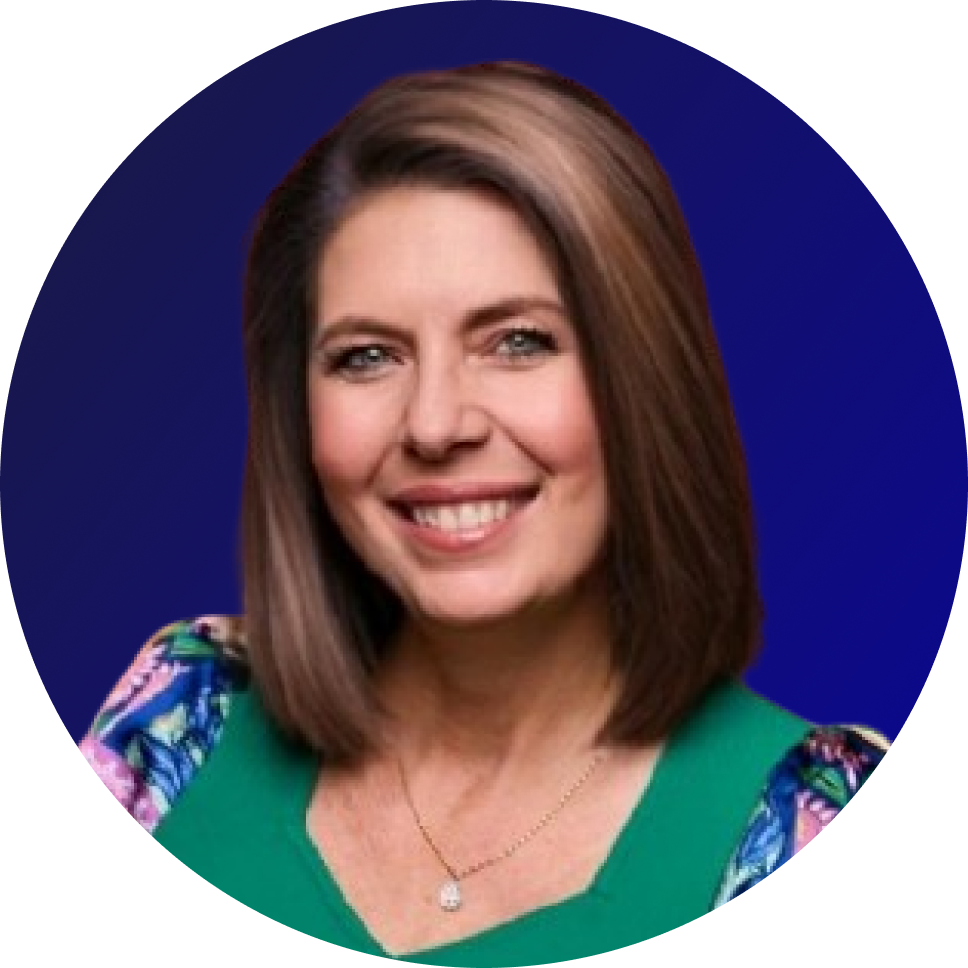Trish Steed, Co-Founder of H3HR Advisory
Blog Post Body
HR is at a crossroads. AI is no longer hype—it’s happening. Workforce transformation isn’t optional, and HR leaders must step up to prove their value beyond compliance and talent management.
Trish Steed, Co-Founder of H3HR Advisory, doesn’t sugarcoat it: HR is either leading change or falling behind.
In her conversation on Skills Connect with Reejig CEO and Co-Founder Siobhan Savage, she shared five critical insights that HR leaders need to hear.
1. HR leaders are overwhelmed by AI—and that’s a problem
AI dominates every conference, every industry report, and every boardroom discussion. But instead of taking action, many HR leaders are either frozen in uncertainty or trying to tackle everything at once. Neither approach works.
Trish’s advice? Start small. Focus on one or two areas where AI can deliver immediate value, like hiring or workforce analytics. A slow, deliberate approach will build confidence and drive meaningful change.
"The true success lies somewhere in between—taking a step-by-step approach."
2. AI Is a tool, not a strategy
HR isn’t in the AI business—it’s in the people business. But too many HR teams are adopting AI without a clear link to real business needs.
AI should never be implemented just for the sake of it. Instead, HR leaders must first understand how their company makes money, what challenges it faces, and how AI can help solve those problems. When AI is tied to business outcomes, it shifts from being a trendy experiment to a true driver of growth.
"They’re trying to implement AI without tying it to a critical business event, which makes it hard to get buy-in."
If HR can’t make a compelling business case, AI will remain just another buzzword.
3. HR’s biggest weakness? Not understanding the business
The best HR leaders don’t just know HR—they know how the business operates. They understand revenue models, market dynamics, and what keeps the CEO up at night.
Yet too many HR professionals work in isolation, disconnected from the financial and strategic realities of their organizations. If you’re not reading earnings reports, tracking shareholder priorities, or aligning HR initiatives with company goals, you’re missing a critical piece of the puzzle.
"One of the most valuable things HR leaders can do is develop a deep understanding of the business—how it makes money, where efficiencies can be gained, and what’s driving executive decision-making."
HR earns influence by proving its impact—not by asking for a seat at the table.
4. AI will reshape jobs—HR must lead or be sidelined
AI isn’t just automating tasks—it’s redefining entire roles. If HR isn’t actively involved in reshaping work, the business will make those decisions without them.
As AI takes over repetitive and administrative tasks, new jobs and skill requirements will emerge. HR’s role isn’t just about reskilling employees—it’s about rethinking how work is structured altogether.
"If HR isn’t part of that conversation, the risk is that AI adoption happens in silos, without considering the long-term workforce implications."
HR leaders need to work closely with operations, IT, and finance to guide how AI-driven changes unfold. If they don’t, they’ll be left reacting to workforce shifts instead of shaping them.
5. HR needs to upskill itself before it can upskill the workforce
HR professionals often talk about upskilling employees—but what about themselves?
AI, automation, and workforce analytics aren’t just technical topics for IT teams. They are now essential knowledge areas for HR leaders. Yet many still lack the confidence and expertise to lead AI-driven workforce planning.
If HR wants to play a role in the future of work, it must invest in its own learning first.
"HR teams are focused on upskilling employees, but they also need to upskill themselves. Understanding AI, automation, and workforce analytics is going to be a baseline requirement for HR leaders moving forward."
The HR professionals who develop AI fluency will stay ahead. Those who don’t risk becoming irrelevant.
Final thought: HR’s defining moment
HR has never had a bigger opportunity to lead. But leadership requires action, not hesitation.
Trish’s message is clear: HR leaders must stop waiting and start shaping the AI-driven transformation of work.
Be bold in embracing change. Be responsible in ensuring people aren’t left behind.
The future of HR isn’t about titles or technology—it’s about impact. The choice is yours.
Will you lead the transformation, or will you be left behind?
Speakers
Siobhan Savage: Welcome everyone to Skills Connect. It's so exciting to have you all here. It is even more exciting to welcome Trish Steed. So Trish, welcome to Skills Connect. This is a series where we have conversations with the boldest and most responsible leaders in our industries, from changemakers to innovators to super passionate community leaders.
I'm Siobhan Savage, the CEO and Co-Founder of Reejig, and today I'm joined by Trish Steed, Co-Founder of H3HR Advisory, a leading HCM advisory firm that provides thought leadership, research, and strategic support to businesses. Trish, you are right in the thick of understanding and hearing from customers directly about the problems they are facing. So we're so excited to have you on this podcast and hear a little bit about what you're seeing.
But first, I’d love to know a little bit about you. How did you get into the space? What’s your background, and what really makes you passionate about this role?
Trish Steed: Thank you for having me, Siobhan.
I think for me, HR has actually been almost a lifelong passion, which I know most people don’t say. Like, "You went to school for human resources?" But I actually did. The reason being—and I think this holds true for many professions—I met my dad’s HR leader when I was still in college, and that completely changed my trajectory. I saw what she was doing at work, how she was impacting this manufacturing business, and I just looked at her and said, "I want to do that."
So I went to school for HR all the way through and got a master’s. I spent almost 20 years—19, to be exact—working my way up in human resources at large professional services firms, healthcare, and public relations. Over the years, I realized that as you move up the hierarchy, the harder the work gets in terms of staying positive because you're handling some of the toughest issues daily.
After about 20 years, someone who had been continually reaching out to me about becoming an analyst convinced me to make the move. I was already blogging in the space, so the two went hand in hand. I added in the research that I love, and I haven’t looked back since. I absolutely love HR.
I’ve also been a podcaster for 12 years now. The show itself is in its 17th season, so it’s been a long time! I’m passionate about HR because there’s such a community that gets built around how we help each other, and I just wanted to be more a part of that—more publicly.
Siobhan Savage: And I love the podcast. I love the conversations, the perspective, and the warmth and empathy you bring. Also, the topics aren't just about technology; they range from real critical events that your HR community is facing at that time, which I love.
In my previous career in HR, there wasn’t a lot of public discussion about the tough stuff because so much of it was private and confidential. There’s so much hidden work and hidden pain. So having a platform where people can listen to others talk about key challenges and how they’re thinking about them—it really becomes like community-based therapy, giving people a voice and reminding them they’re not alone.
Trish Steed: Absolutely. And I think it also demonstrates that you don’t have to be in a big organization to activate people. There is a community out there just waiting for someone to take the lead. Years ago, my business partner and I started HR Evolution with a few others, and just creating that community, activating people, and getting things done has been incredibly positive in my career. So yes, always innovating and looking for new ways to continue that growth.
Siobhan Savage: Given your perspective as an analyst and your experience talking to customers with real-world problems, where are we as an HR community? If we strip away the AI hype and the recessionary ups and downs, what are the actual problems people are facing right now?
Trish Steed: That’s a great question. I recently attended two large global events where I spoke with a lot of CHROs and VPs of HR, and the number one concern across the board is uncertainty—whether it’s politics, economics, or other factors. HR leaders are unsure whether to continue down their current paths, how to approach their C-suite, or whether they should slow things down. That uncertainty is at the core of a lot of decision-making right now.
The second major topic is staying on top of issues beyond AI. Topics like DEI are evolving due to political shifts, and what happens in the U.S. has a massive ripple effect globally.
Surprisingly, I’ve also been hearing that HR leaders are getting tired of every conversation being about AI. Of course, they want to educate themselves, but they also need to focus on the core functions of HR—bringing in talented individuals, keeping them engaged, and driving business outcomes. Some feel that AI has become a distraction rather than a tool for achieving these fundamental HR goals.
Siobhan Savage: That’s really interesting. If I were back in my HR role and my business was focused on operational efficiency and redesigning work, I would expect AI to be at the center of that conversation—it should flow into how we hire, how we reward, and how we operate.
But what you’re saying makes me question whether I’m in an echo chamber of my own thought process. Are people on the ground not seeing the scale of transformation AI will bring? Or is it that they know but are hesitant to take action?
Trish Steed: I think it’s a little of both. We, as analysts and those embedded in HR tech, understand the depth of AI’s potential impact, but for HR leaders, it can feel like drinking from a fire hose. Some freeze, unsure of what to do next, while others try to transform everything at once. The true success lies somewhere in between—taking a step-by-step approach.
I recently did a keynote at HR Tech Europe, and afterward, several leaders came up to talk about this exact issue. What I told them is that if they start with just one or two areas, they won’t feel as overwhelmed. Maybe it’s starting at the point of hiring—focusing on AI’s role in talent acquisition rather than overhauling everything at once. That kind of measured approach seems to resonate more with HR leaders right now.
Siobhan Savage: That makes sense. A lot of the conversations I have with HR leaders today focus on how to get funding for transformation. Many of them don’t even check their own company’s earnings reports to see what the CEO and shareholders are prioritizing. They’re trying to implement AI without tying it to a critical business event, which makes it hard to get buy-in.
And it’s not about doing AI for AI’s sake. It’s about understanding what the business truly needs. When AI is used strategically, it’s not just about cost-cutting—it’s about reallocation and growth. That’s where HR has a massive opportunity to step in and shape the future of work.
Trish Steed: Absolutely. And I think that’s where the disconnect can happen. Many HR leaders are dealing with day-to-day operational pressures and don’t have the time to step back and align their strategies with business objectives. But that alignment is crucial, especially now, when every CEO and CFO is looking at operational efficiency and AI-driven transformation.
One of the most valuable things HR leaders can do is develop a deep understanding of the business—how it makes money, where efficiencies can be gained, and what’s driving executive decision-making. That kind of knowledge not only makes HR leaders more credible in strategic discussions but also allows them to be proactive in shaping the workforce of the future.
Siobhan Savage: That’s exactly it. HR has this huge opportunity right now to lead in a way that’s never been possible before. But it’s about being bold and responsible—bold in embracing transformation, but responsible in ensuring that people aren’t left behind in the process.
And when we talk about AI, I think it’s important to acknowledge that it’s not just about reducing costs or automating jobs. It’s also about creating new opportunities, reallocating talent, and ensuring that people are working on the highest-value tasks. If HR isn’t part of that conversation, the risk is that AI adoption happens in silos, without considering the long-term workforce implications.
Trish Steed: Exactly. And that’s why HR leaders need to take a proactive approach in understanding AI’s impact. If they wait until transformation is already happening, they’ll be reacting rather than leading.
The other piece is upskilling. A lot of HR teams are focused on upskilling employees, but they also need to upskill themselves. Understanding AI, automation, and workforce analytics is going to be a baseline requirement for HR leaders moving forward. It’s not just about adopting new technology—it’s about truly integrating it into workforce strategy.
Siobhan Savage: Yes! And I think that’s where the best HR leaders will set themselves apart. The ones who are embedding AI knowledge into their strategy, who are aligning with business outcomes, and who are leading with a mix of bold innovation and responsible workforce planning—those are the leaders who will thrive in this new era of work.
Trish, this has been such a great conversation. Thank you for sharing your insights. I know our listeners will take a lot away from this discussion.
Trish Steed: Thank you for having me, Siobhan! It’s always a pleasure to chat, and I’m excited to see how HR continues to evolve in the coming years.
Siobhan Savage: To everyone listening, thank you for joining us on Skills Connect. You can find Trish on LinkedIn and check out her podcast for more great discussions on the future of work. Until next time, keep leading boldly and responsibly!



